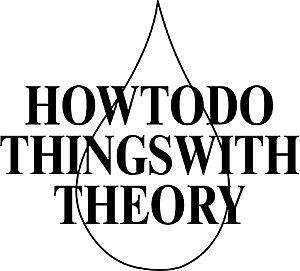HTDTWT: formal framework 2024-2025
HTDTWT is a two year study trajectory designed to develop skills to formulate relevant questions related to theory. It consists of two equally important parts: seminars & the writing of a master thesis, supported by a training in academic writing.
First and second year students study together in the seminars. The thesis writing trajectory is divergent.
FIRST YEAR STUDENTS (INCOMING 2024)
* Compulsory Choice | 17 ECTS | 476 hours in total
* participation in seminars, academic writing course & the writing of a thesis proposal
Seminars: 91 hours
Academic Writing: 12 hours
Self study (reading + writing): 373 hours
SEMINARS
13 days of seminars led by the 6 theory-tutors ( each student takes part in one out of six different seminars, after a process of matchmaking).
Mandatory presence seminars: 100% attendance is strongly recommended, but if there are urgent reasons for non-attendance, you are, by law, allowed to miss out on two and a half day (2.5) out of 13 days, without an additional task above the required hours of self-study.
If your absence extends beyond that number, an additional task (always tailor-made !) must be agreed upon your theory tutor, the research curator, the study trajectory counsellor, the head of program and by yourself, backed by the Central Exam Committee.
ACADEMIC WRITING
4 sessions of 1.5 hours + individual coaching in academic writing
Mandatory presence academic writing: 100% attendance is strongly recommended, but if there are urgent reasons for non-attendance, you are, by law, allowed to miss out on 1 session.
SELF STUDY + OUTPUT:
*Written statement of intent
*Preparation for each seminar (extensive reading + writing) + writing excersises academic writing
*Written thesis proposal at the end of the academic year
TESTING:
Formative midterm evaluations HTDTWT first year
*Midterm formative evaluation:
Confluence 3 ~ midterm second year
Individual conversation (with the help of a checklist provided by the research curator), between first and second year students and tutors.
Summative final assessment First Year HTDTWT
*End of year:
Combination of formative & summative testing
*Assessors: theory tutor + education leader / BKE certified examiner.
At the conclusion of the first year, each student will be assessed by their tutor plus the education team leader on "research & participation” in the seminars (including the academic writing course), and “research & writing" for the thesis proposal. Both assessments are brought together in an overall assessment which will be shared towards the beginning of the second year.
Pass or fail.
SECOND YEAR STUDENTS (INCOMING 2023)
* Compulsory Choice | 17 ECTS | 476 hours in total
* participation in seminars & the writing of a thesis
Seminars: 91 hours
Individual thesis coaching: 5 hours
Self study (reading + writing): 380 hours
SEMINARS
13 days of seminars led by the 6 theory-tutors ( each student takes part in one out of six different seminars, after a process of matchmaking).
Mandatory presence seminars: 100% attendance is strongly recommended, but if there are urgent reasons for non-attendance, you are, by law, allowed to miss out on two and a half day (2.5) out of 13 days without an additional task above the required hours of self-study.
If your absence extends beyond that number, an additional task (always tailor-made !) must be agreed upon your theory tutor, the research curator, the study trajectory counsellor, the head of program and by yourself, backed by the Central Exam Committee.
THESIS WRITING
Contact hours (mainly) online: tutor and student meet during coaching sessions around the student's written input (new input = conditional for each meeting). In the course of the second year this concerns 4 - 5 sessions. Duration of each session = variable.
SELF STUDY:
*Preparation for each seminar (reading + writing).
*Writing of the master thesis.
TESTING
Formative midterm evaluations HTDTWT second year
Confluence 3 ~ midterm second year
Individual conversation (with the help of a checklist provided by the student trajectory counsellor), between second year student and tutor.
Summative FINAL assessment First & Second Year HTDTWT
*End of year:
Combination of formative & summative testing guided by DAI's
COMPETENCIES | FINAL QUALIFICATIONS DAI
*Assessors: theory tutor + education leader / BKE certified examiner.
At the end of the second year the theory will assess “participation and research” in the seminar.
After the finalization of the thesis, ideally at the conclusion of the second year, “research and writing” for the thesis will be assessed by the theory tutor, supervised by the education team leader and a BKE certified examiner.
Both assessments are brought together in an overall assessment, which will be shared during the graduation ceremony.
How To Do Things With Theory is concluded successfully concluded when the student is credited with at least a ‘satisfactory’ by the tutor(s) in the overall assessment.

